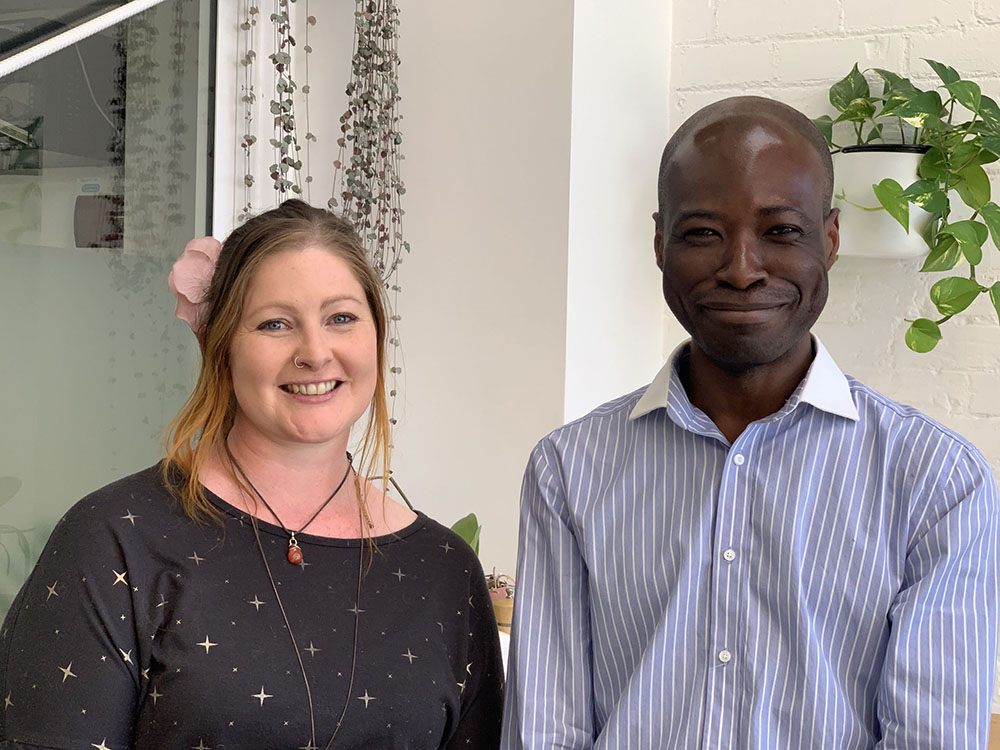Without question, Ara | Te Pūkenga Disability Facilitators understand their ‘why’.
01 February, 2023
Key principles behind supporting and empowering students to co-design their study journey

Katie Howie and Kwame Otu-Danquah seek to make a difference through building relationships across campus.
Already diving into meetings with their departments for the New Year, Ara | Te Pūkenga’s Disability Facilitators are looking to build on their roles which were established in 2022 – seeking to strengthen relationships and help make a real difference for disabled ākonga (students).
Katie Howie and Kwame Otu-Danquah were appointed to support kaiako (tutors) and tāngata whaikaha (disabled learners) in two departments: Engineering and Architecture Studies (EAS) and Hospitality, Business and Service Industries (HBSI).
Their roles are being piloted as part of Ara’s Disability Action Plan (DAP), a clear, principles-based strategic plan developed to increase access, participation and success for disabled learners.
Director of Disability and Inclusion John Grant says integrating the six key principles in the plan consistently is fundamental to collaborating effectively and bringing about transformational change.
“Quickly summarised, the principles ensure our approach seeks to be ākonga-centred, mana-enhancing and self-determining with a focus on acting early, relationship-building and having supports that are easy to use.” He adds that the DAP helps to keep focus on the ‘why’.
“Sometimes people might find working in a principles-based way challenging because it requires more thought and consideration than simply following a process or adhering to a mapped route. A small example could be changing something incredibly simple such as phoning a student rather than communicating via email because it meets their needs better,” he said with a smile. “We take a principles-based approach because at Ara, we believe no two people are the same, particularly when it comes to disability.”
Ara’s Disability Facilitators bring a wealth of experience to their roles. With a degree in Human Service and Psychology, Howie worked at length for Skillwise, a local not-for-profit supporting adults with intellectual disabilities. Otu-Danquah, worked as an optometrist in Ghana before moving to New Zealand and is working towards his PhD examining the experiences of disabled learners, particularly those with visual impairments, in the tertiary sector.
While new on the ground in 2022, they got to work offering advice and resources to academic staff, and if invited, were available to speak to classes about their services. They also held regular ‘office hours’ in handy areas around their departments where kaimahi or ākonga could drop in to talk.
Now they’re now looking to further develop relationships across departments and be ready to collaborate further on Individual Plans (IPs) for ākonga who self-identify with a disability and are registered with Disability Services.
“It is important that the Individual Plans are developed collaboratively with Disability Services, the Academic Department and tāngata whaiaka,” Howie said, adding “We want to ensure they are empowered by having the opportunity to co-design their learning journey and the supports that will make this the best possible experience.”
“Basically, we’re looking to move away from a somewhat ‘transactional’ approach when systems and processes dominate, to a more person-centred approach where relationship-building, personalised support and collaboration dominates,” Otu-Danquah said. “That way the learner is front and centre taking a lead in crafting their experience at every step.”
Grant says he’d like to put measures around the success of these facilitator roles, assessing how easy-to-access, in-department support contributes to better learning experiences and outcomes for tāngata whaikaha.
“This has to be meaningful and evidence-based,” Grant said. “We really want to monitor where the added value is for ākonga and kaiako in terms of the learner experience, from satisfaction to course completions and how future prospects are impacted.”
Growing the disability facilitator roles is far from the only focus for Ara’s Disability Support Services team.
Grant says they’re looking forward to rolling out Disability Confidence Training across campuses beginning in mid-February, a toolbox of resources for Kaiako, a principles-based practice framework and an exciting Transition from School project.
“Positive change overall in the equity landscape in education is gaining momentum,” Grant said. “It’s exciting to be working on strategies unique to the disability space and we are looking forward to seeing initiatives at Ara make a real difference to people’s learning and lives.”